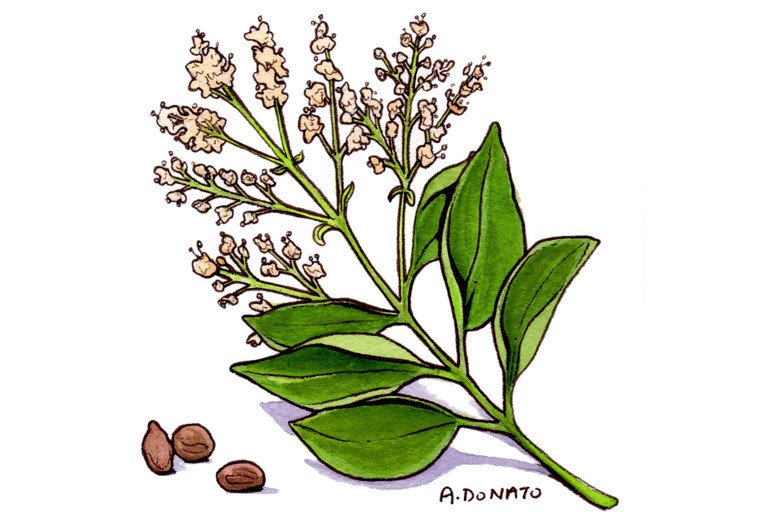
Common Names
- Privet
- Nu zhen zi
- Glossy privet
- Dong qing zin
For Patients & Caregivers
Tell your healthcare providers about any dietary supplements you’re taking, such as herbs, vitamins, minerals, and natural or home remedies. This will help them manage your care and keep you safe.
Ligustrum lucidum has not been shown to treat cancer in humans.
Ligustrum lucidum is a Chinese medicinal herb used to treat poor vision, dizziness, fever, and insomnia, and to increase immune function in cancer patients. In vitro studies suggest it has antioxidant, antitumor, and immune function effects. A few animal studies suggest properties that may have benefits on bone and vision.
Data in humans are quite limited. In a small study of non-small cell lung cancer patients undergoing chemotherapy, a formula containing reishi mushroom and Ligustrum was found to help maintain quality of life (22). Additional studies to confirm efficacy and safety are needed.
- Cancer treatment
In vitro studies suggest L. lucidum has anticancer properties, but clinical evidence is lacking. - Immunostimulation
Data from lab studies suggest L. lucidum may change immune response. - To improve eyesight
L. lucidum is used in Chinese medicine to treat poor eyesight, but clinical evidence is lacking. - To treat dizziness
L. lucidum is used in Chinese medicine to treat dizziness, but clinical evidence is lacking. - Fever
This use is not backed by scientific evidence. - Insomnia
There are no data to support this use.
Do Not Take if:
You have hypersensitivity to Ligustrum lucidum.
For Healthcare Professionals
Ligustrum lucidum is a medicinal plant that is often used in combination with other herbs in traditional Chinese medicine. There are several species of Ligustrum that are thought to have different medicinal properties (2) (3). Traditionally, the plant is used to treat diminished eyesight, dizziness, fever, and insomnia. Some herbalists also use it to treat side effects caused by chemotherapy and to increase immune function in cancer patients.
In vitro studies suggest that the fruits of Ligustrum lucidum have antitumor (4) (5) (6), immunomodulatory (7) (13), antidiabetic (12), antiosteoporotic (15), antiviral (8) (16), antimutagenic (9) (10), hepatoprotective (11), and cytotoxic effects (17) (18). In animal models, Ligustrum compounds showed antiosteoporotic (19) and vision-sparing (20) effects. Ligustrum combined with Siberian ginseng may have protective effects against chemotherapy-induced myelosuppression (21).
Data in humans are quite limited. In a small study of non-small cell lung cancer patients undergoing chemotherapy, a formula containing reishi mushroom and Ligustrum was found to help maintain quality of life (22).
- Cancer
- Immunostimulation
- Dizziness
- Fever
- Insomnia
- Poor vision
In vitro studies suggest antitumor effects occur via immunomodulation and by reverting macrophage suppression brought about by tumors (4), or are due to increases in phagocytes and lymphokine-activated killer cells (5). Ligustrum may induce apoptosis in human hepatocellular carcinoma cells via p21 upregulation (17). Hepatoprotective effects are due to oleanolic acid and perhaps mediated by an increase in hepatic glutathione regeneration capacity (11).
Secoiridoid glucosides showed antioxidant effects against free radical-associated hemolysis of erythrocytes (1). The secoiridoid glucoside oleuropein has demonstrated antiviral activity against respiratory syncytial virus and parainfluenza type 3 virus (8) while other secoiridoid compounds showed activity against influenza A virus (16). The compound specnuezhenide may confer vision improvement effects via inhibition of HIF-1alpha/VEGF signaling pathway (20).
Salidroside and nuzhenide have been identified as potential antiosteoporotic compounds (15). In a murine model of diabetes-induced osteoporosis, ligustroflavone from Ligustrum fruit appeared to have protective effects via regulation of parathyroid hormone levels and improved calcium balance by acting on calcium-sensing receptors (19).
Hypersensitivity to this herb.
None reported.